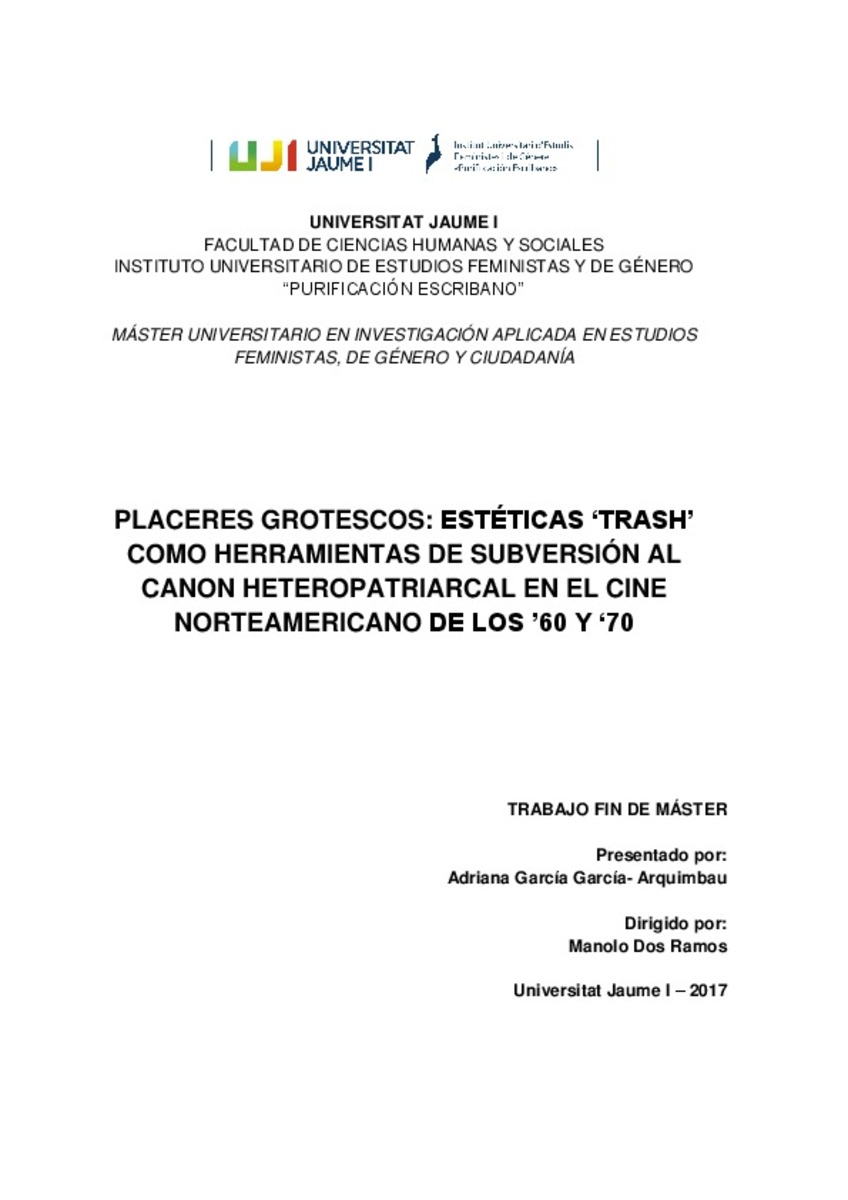Mostrar el registro sencillo del ítem
Placeres grotescos: estéticas "Trash" como herramientas de subversión al canon heteropatriarcal en el cine norteaemericano de los '60 y '70
| dc.contributor.author | García García-Arquimbau, Adriana | |
| dc.contributor.other | Dos Ramos, Manolo | |
| dc.date.accessioned | 2018-03-01T10:40:22Z | |
| dc.date.available | 2018-03-01T10:40:22Z | |
| dc.date.issued | 2017-11-27 | |
| dc.identifier.uri | http://hdl.handle.net/10234/173114 | |
| dc.description | Treball Final de Màster Universitari en Investigació Aplicada en Estudis Feministes, de Gènere i Ciutadania. Codi: SBH023. Curs: 2016/2017 | ca_CA |
| dc.description.abstract | As some philosophers close to Marxism affirm, the cinema can be read as an "ideological apparatus of the state" through which an ideology is reproduced and legitimized that naturalizes the current hegemony sustained in the patriarchal order. In the decades of the '60s and' 70s and covered by the "cultural studies" feminist film criticism would argue how the representative films of classical Hollywood established a kind of gaze made for the enjoyment of hegemonic masculinity at the expense of reification and banalization of women and invisibilization of other sexual identities. One of the mechanisms of domination would be to standardize a canon - actually a patriarchal one - as universal and an exponent of good taste through which we would define what were all the aesthetics associated with bad taste and which we consider potentially subversive such as the excessive, exaggerated, artificial or exuberant. Therefore, many young critics of the system would devise and use different grotesque and subversive aesthetics to criticize this masculine gaze. They would do so by deliberately using other aesthetics -based on "bad taste" - that would be read as subversive tools to the androcentric aesthetic canon, thus producing many films whose characters defied the heteropatriarchal system through aggressive feminisms, trans or intersex characters or grotesque women clearly away from contention, as an example of this we will analyze three films -Faster, pussycat! Kill! kill!, Myra Breckinridge and Pink Flamingos- with the intention of demonstrating the originality and freshness of new discourses as well as their liberating potential. | ca_CA |
| dc.description.abstract | Como algunos filósofos cercanos al marxismo afirman, el cine puede leerse como un “aparato ideológico del estado” a través del cual se reproduce y legitima una ideología que naturaliza la hegemonía vigente sustentada en el orden patriarcal. En las décadas de los ’60 y ’70 y amparada en los “cultural studies” la crítica fílmica feminista argumentaría cómo las películas representativas del Hollywood clásico establecían un tipo de mirada hecha para el disfrute de la masculinidad hegemónica a costa de la cosificación y banalización de las mujeres e invisibilización de otras identidades sexuales. Uno de los mecanismos de dominación pasaría por estandarizar un canon –en realidad patriarcal y androcéntrico- como universal y exponente del buen gusto así como de la calidad cinematográfica. Por ello, muchos jóvenes críticos con el sistema idearían y usarían diferentes estéticas para criticar la mirada masculina. Ello lo harían utilizando deliberadamente unas sensibilidades -basadas políticamente en el "mal gusto”- que se leerían como herramientas subversivas al canon estético androcéntrico. De esta forma se produjeron muchísimas películas cuyos personajes desafiaban el sistema heteropatriarcal a través de feminidades agresivas, personajes trans o intersexuales o mujeres grotescas claramente alejadas de la contención. Como ejemplo de ello analizaremos tres películas –Faster, pussycat! Kill! kill!, Myra Breckinridge y Pink Flamingos- con la intención de demostrar la originalidad y frescura de nuevos discursos así como su potencial liberador. | ca_CA |
| dc.format.extent | 90 p. | ca_CA |
| dc.format.mimetype | application/pdf | ca_CA |
| dc.language.iso | spa | ca_CA |
| dc.publisher | Universitat Jaume I | ca_CA |
| dc.rights | Atribución-NoComercial-CompartirIgual 4.0 Internacional | * |
| dc.rights.uri | http://creativecommons.org/licenses/by-nc-sa/4.0/ | * |
| dc.subject | Màster Universitari en Investigació Aplicada en Estudis Feministes, de Gènere i Ciutadania | ca_CA |
| dc.subject | Máster Universitario en Investigación Aplicada en Estudios Feministas, de Género y Ciudadanía | ca_CA |
| dc.subject | Master's Degree in Applied Research in Feminist, Gender and Citizenship Studies | ca_CA |
| dc.subject | Cinema | ca_CA |
| dc.subject | Trash culture | ca_CA |
| dc.subject | Trash cinema | ca_CA |
| dc.subject | Camp aesthetics | ca_CA |
| dc.subject | Bad taste | ca_CA |
| dc.subject | Feminism | ca_CA |
| dc.subject | Counterculture | ca_CA |
| dc.subject | Popular culture | ca_CA |
| dc.subject | Mainstream | ca_CA |
| dc.subject | Exploitation cinema | ca_CA |
| dc.subject | Paracine | ca_CA |
| dc.subject | Masquerade | ca_CA |
| dc.subject | Cine | ca_CA |
| dc.subject | Cultura basura | ca_CA |
| dc.subject | Cine trash | ca_CA |
| dc.subject | Estética camp | ca_CA |
| dc.subject | Mal gusto | ca_CA |
| dc.subject | Feminismo | ca_CA |
| dc.subject | Contracultura | ca_CA |
| dc.subject | Cultura popular | ca_CA |
| dc.subject | Cine de explotación | ca_CA |
| dc.subject | Paracine | ca_CA |
| dc.subject | Mascarada | ca_CA |
| dc.title | Placeres grotescos: estéticas "Trash" como herramientas de subversión al canon heteropatriarcal en el cine norteaemericano de los '60 y '70 | ca_CA |
| dc.type | info:eu-repo/semantics/bachelorThesis | ca_CA |
| dc.educationLevel | Estudios de Postgrado | ca_CA |
| dc.rights.accessRights | info:eu-repo/semantics/openAccess | ca_CA |
Ficheros en el ítem
Este ítem aparece en la(s) siguiente(s) colección(ones)
-
TFM: Master Universitari en Investigació Aplicada en Estudis feministes, de Gènere i Ciutadania [169]
SBH023; SAS023, SBQ023; SBR023; SBU007








